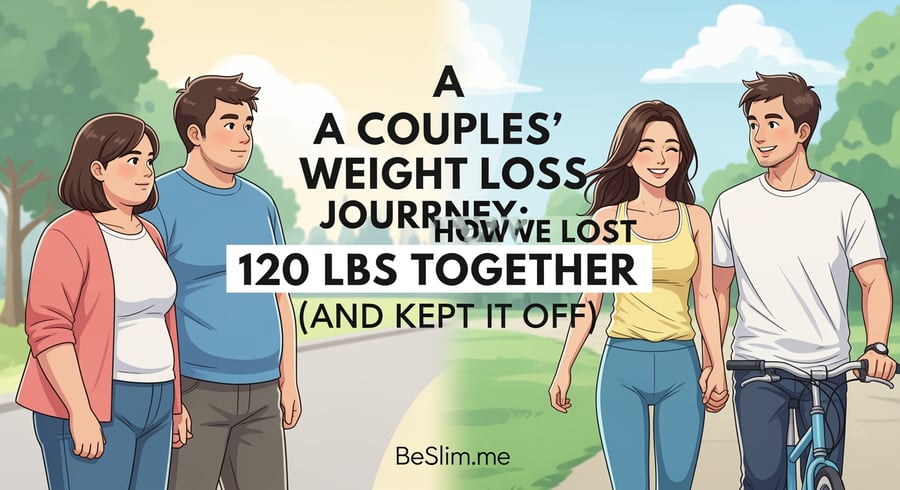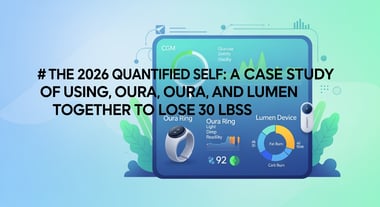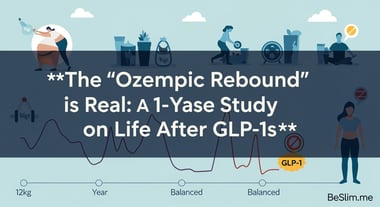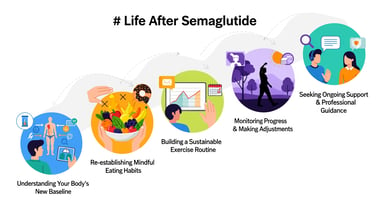Hello, I'm Master Kim, your Empathic Storyteller and Editor at BeSlim.me. I've had the privilege of hearing countless stories of transformation, and today, I want to share one that truly touches my heart—a couple's journey through weight loss together. This isn't just about shedding pounds; it's about partnership, resilience, and rediscovering joy in the everyday. I'll narrate their story with honesty, drawing from their own words, and intersperse my thoughts as I go. If you're reading this and feeling stuck in your own struggles, know that I see you, and stories like this remind me that change is possible when we face it hand in hand.
The Struggle: The 'Before'
Let me introduce you to Sarah and Mike, a couple in their mid-40s who had been together for over 15 years. They met in college, bonded over late-night study sessions fueled by pizza and soda, and built a life filled with love, two kids, and demanding careers. But as the years piled on, so did the weight. Sarah, a marketing executive, tipped the scales at 220 pounds, while Mike, a software engineer, was at 280 pounds. Together, they carried an extra 150 pounds that weren't just physical—they were emotional anchors dragging them down.
I remember Sarah telling me how it started innocently enough. "We were always the couple who celebrated with food," she said. Weekends meant brunches laden with pancakes and bacon, evenings curled up with takeout and Netflix. But life got busier: promotions at work meant longer hours, the kids' activities filled their schedules, and stress became their constant companion. Mike shared that he turned to comfort eating after a tough day, grabbing chips or ice cream to unwind. Sarah nodded in agreement, admitting she'd skip meals during the day only to binge at night, feeling guilty but unable to stop.
The emotional toll was profound. Sarah felt self-conscious in her clothes, avoiding mirrors and social gatherings. "I didn't want to be the 'fat friend' anymore," she confessed, her voice breaking. Mike struggled with low energy, snoring that kept them both awake, and a nagging fear of health issues like his father's heart disease. They tried diets—keto, paleo, even juice cleanses—but nothing stuck. One attempt saw them lose 20 pounds each, only to gain it back plus more when the restrictions became unbearable. "It was like a vicious cycle," Mike said. "We'd motivate each other at first, but then one slip-up, and we'd both spiral."
I can relate to this deeply; in my years of listening to these stories, I've seen how weight gain often masks deeper issues like emotional eating tied to stress or unresolved habits from the past. For Sarah and Mike, failed attempts bred frustration and blame. Arguments flared over skipped workouts or hidden snacks, straining their marriage. Sarah recalled a particularly low point: a family vacation where she couldn't keep up with the kids on a hike, tears streaming as she sat on a rock, feeling like a failure. Mike felt helpless, knowing his own habits were part of the problem. They were trapped in a shared struggle, their love tested by the very routines that once brought them comfort.
Physically, the signs were alarming. Sarah dealt with joint pain and prediabetes, while Mike's blood pressure crept higher. Doctor visits became routine, with warnings about obesity-related risks echoing in their minds. Yet, motivation waned amid the chaos of daily life. "We knew we needed to change," Sarah said, "but it felt impossible alone." And that's the truth I see so often—weight loss isn't just individual; for couples, it's intertwined with partnership dynamics, where one person's setback can ripple to the other.
The Turning Point: The 'Solution'
Everything shifted one rainy evening when Sarah stumbled upon an online article about sustainable weight loss for couples. It wasn't a quick-fix promise but a discussion on how shared accountability could rewire habits. Intrigued, they decided to seek professional help, enrolling in a couples' wellness program at their local clinic. This wasn't about extreme measures; it was about understanding the science behind their struggles and building a plan together.
As I listened to them recount this phase, I was struck by how pivotal that decision was. The program introduced them to key concepts like leptin resistance, where the body's hunger hormone gets out of whack from chronic overeating, making it harder to feel full. Sarah explained how learning this helped them forgive themselves— it wasn't just willpower; biology was at play. They started with small changes, like tracking meals to reset their leptin signals through balanced nutrition rather than starvation diets.
Cortisol management became another cornerstone. Mike, always the analytical one, dove into the research, discovering how stress hormones like cortisol can promote fat storage, especially around the belly. "Work stress was killing us," he said. They incorporated daily walks together, not as grueling exercise but as time to talk and de-stress. This simple habit helped lower cortisol levels, making weight loss more achievable. I love this part because it shows how science can empower rather than overwhelm—by addressing stress, they tackled the root of their emotional eating.
Habit formation was the glue that held it all together. Drawing from principles like those in atomic habits, they focused on tiny, consistent actions: prepping veggies for snacks, setting a shared bedtime to improve sleep, and celebrating non-scale victories like better-fitting clothes. The program emphasized behavioral psychology, teaching them to cue positive behaviors— for instance, placing workout shoes by the door as a visual reminder. Scientifically, this aligns with how repeated actions strengthen neural pathways, making healthy choices automatic over time.
To support these ideas, they referenced solid research. For leptin resistance, they learned from studies showing how consistent calorie control and protein-rich meals can improve hormone sensitivity study on leptin resistance and dietary interventions. On cortisol, evidence highlighted mindfulness practices reducing stress-induced weight gain research on cortisol management through lifestyle changes. And for habit formation, they drew from work on neuroplasticity, where small habits lead to lasting change insights into habit formation from NIH studies.
What made this turning point special was the couples' aspect. They attended sessions together, turning potential conflicts into collaborative problem-solving. If one felt tempted by dessert, the other offered a gentle reminder or an alternative like fruit with yogurt. "It felt like we were a team again," Sarah said. They lost the first 30 pounds collectively in three months, not through magic but through effort and mutual support. I often tell people that the 'solution' isn't a pill or fad; it's rediscovering your why and leaning on those who love you.
The Success: The 'After'
Fast forward two years, and Sarah and Mike have lost a combined 120 pounds—Sarah down to 160, Mike to 220—and kept it off. But as I always emphasize, the numbers are just a footnote; the real transformation is in their lives. Sarah beams when she talks about chasing her kids around the park without breathlessness, her energy levels soaring. Mike shares how his blood pressure normalized, and he sleeps soundly, no more snoring disrupting their nights. Their marriage? Stronger than ever. Date nights now involve hiking trails or cooking healthy meals together, reigniting the spark that dimmed under the weight of old habits.
Physically, the changes are evident: reduced joint pain for Sarah, better mobility for Mike. But emotionally, it's profound. "I feel like myself again," Sarah said, no longer hiding from photos or social events. Mike echoed this, noting how confidence boosted his career—he even got a promotion after tackling projects with renewed vigor. They've maintained their progress by integrating lessons into daily life: weekly meal planning as a couple, accountability check-ins, and flexibility for life's ups and downs. A family trip to the mountains last summer was a highlight—hiking peaks they once deemed impossible, laughing all the way.
I admire how they've turned their journey into inspiration for others, sharing tips with friends and even starting a small support group. It's a testament to sustainable change: no yo-yo dieting, just consistent, empathetic effort. Their story validates that weight loss, especially as a couple, reshapes not just bodies but relationships and self-worth.
Key Lessons for Your Journey
Build a Support System Together: Partner with your loved one to create shared goals and accountability—research shows couples who tackle weight loss jointly have higher success rates due to mutual motivation.
Address the Science Behind Struggles: Understand concepts like leptin resistance and cortisol to make informed changes; focus on balanced nutrition and stress reduction for long-term results.
Prioritize Habits Over Quick Fixes: Start small with consistent actions, like daily walks or meal prep, to form lasting behaviors that outlast any diet trend.
In sharing Sarah and Mike's story, I hope it resonates with you. Weight loss journeys are deeply personal, often fraught with setbacks, but when faced together, they become stories of triumph. If this inspires you to take that first step, remember: you're not alone. Keep going, one day at a time.
References
- study on leptin resistance and dietary interventions - pubmed.ncbi.nlm.nih.gov
- research on cortisol management through lifestyle changes - mayoclinic.org
- insights into habit formation from NIH studies - nia.nih.gov
Medical Disclaimer
The content on this website is for informational and educational purposes only. It is not intended as medical advice and should not be relied upon as a substitute for consultations with qualified healthcare professionals who are familiar with your individual medical needs. Always seek the advice of your physician or other qualified healthcare provider with any questions you may have regarding a medical condition. Never disregard professional medical advice or delay in seeking it because of something you have read on this website.




